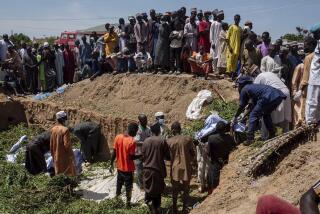Nigerian Town Has Flare for the Traumatic
- Share via
EBOCHA, Nigeria — This village of plywood shanties next to an oil collection depot gets its name from the natural gas flares that thunder 250 feet high and turn night into day--Ebocha, or “bright place.”
At One for the Road, a ramshackle open-air restaurant where villagers dine in the perpetual orange glow of the giant flames with no need for electric bulbs, manager Tom Mopehy complains that the unrelenting noise, shimmering heat and acrid smell do not help his business.
“Only poor men eat here. Rich oil men don’t want to come,” Mopehy said. “The only thing we get is their fire.”
International oil companies burn about three-quarters of the natural gas that is extracted with the oil pumped from this West African nation’s swampy Niger Delta.
Environmentalists hate the practice, contending that the flares spew greenhouse gases into the sky and gases that create acid rain. Villagers say the fires cause health problems and hurt vegetation and wildlife.
President Olusegun Obasanjo’s government would like to see the flares extinguished for another reason. Officials hope to profit from growing international demand for natural gas--Nigeria flares about 2.7 billion cubic feet of gas each day, or about 40% of the daily consumption of California.
For now, though, the international companies working in the delta say it is cheaper to burn off the gas, even when they are fined by the government about 15 cents for every thousand cubic feet of gas they flare.
They say it costs too much too collect, liquefy and ship to market because of the difficult conditions in the delta, a Scotland-size region of jungles and swamps where roads are few.
Aside from the difficult geography, the companies say plans to build gas pipelines and processing plants are hampered by hostile villagers who routinely sabotage facilities and demand “protection” money and environmental compensation from repair crews.
Another option common in Western countries, re-injecting the gas into the ground, is not feasible in most parts of the delta because of the area’s geologic makeup, say the companies, which include Shell, Chevron, Mobil, Texaco and Italian-based Agip, which runs the oil depot at Ebocha 60 miles from the eastern city of Port Harcourt.
Nigeria is the world’s 12th-largest oil producer and the United States’ fifth-biggest supplier of oil.
But experts say the country’s oil wealth is minuscule compared to the enormous untapped reserves of natural gas, estimated at 150 trillion to 200 trillion cubic feet, or enough to meet Africa’s current energy needs for 700 years.
Some industry experts estimate Nigeria could earn $6 billion a year from natural gas. Obasanjo, whose 1999 election ended 15 years of military rule, has ordered companies to stop flaring this decade.
Nigeria has only a tiny domestic market for natural gas, which among other things can be used to fuel camp stoves, manufacture fertilizer and power electricity generating stations. Bureaucratic inertia and economic weakness have left most of Nigeria’s 120 million people perpetually without electricity--the state power utility NEPA is popularly known as “Never Enough Power Anywhere.”
For the continent as a whole, just one in 10 Africans has access to modern energy, the World Bank says.
“It is easy for anybody to say that we have gas to last us the next 700 years and everyone should stop flaring right away,” said E. O. Shadiya, director of Chevron’s gas projects in Nigeria. “But the reserves are not the thing. It is the market that is the constraint. The rest is details.”
Environmentalists say that’s not what is important. Nigerian activists are pressuring the government to quickly end flaring, which the World Bank says releases millions of tons of carbon dioxide and methane into the air each year. Trace levels of sulfur dioxide emissions lead to acid rain, environmentalists say.
“The Nigerian people are waking up to what gas flaring is doing. It has a global effect, but the communities nearby feel it most,” said Ambrose Wonkoya, a chemist with the Nigerian environmental group Greenwatch.
Villagers who live close to flares complain of a litany of medical problems ranging from sores to respiratory diseases and digestive disorders. Crops fail, fish and birds die in the heat, and the zinc roofing used to cover shanties rusts more quickly, they say.
Companies insist there are no adverse health or environmental effects from flaring, citing health surveys they conducted in the 1990s.
“Sure, there is definitely heat,” Shadiya said. “That is why people should not choose to live close by. But you find areas where there is flaring are just as lush as anywhere else.”
At Batan, a fishing village reachable only by boat, hundreds of people live in the glare of gas flares at a Shell oil pipeline pump station. The leaves on trees closest to the flames are tinged brown, and community leaders say children frequently fall ill from the fumes.
“We are human beings, images of God. We are not animals and should not be living like this,” said the village’s leader, Alex Ebi Fenimine.
Precious Omuku, a senior Shell official in Lagos, Nigeria’s commercial capital, said Shell could not take responsibility for the welfare of the Batan residents because they had moved to the site after the pumping station was built.
“Wherever we build a facility, people will flock there,” he said.
More to Read
Sign up for Essential California
The most important California stories and recommendations in your inbox every morning.
You may occasionally receive promotional content from the Los Angeles Times.













